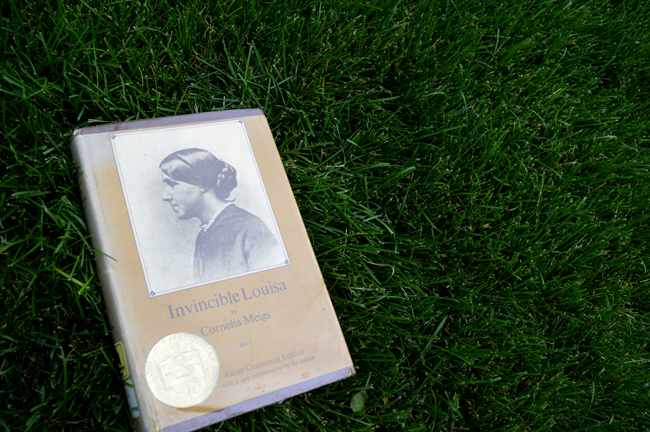This week’s Newbery winner was another surprise—the 1934 biography of Louisa May Alcott: Invincible Louisa: The Story of the Author of Little Women by Cornelia Meigs. Published a hundred years after her birth, Invincible Louisa traces the Alcotts’ many (29 in 28 years) moves across New England with their four daughters: Anna, Louisa, Elizabeth and May. Those four sisters and their dedicated mother would be the inspiration for Meg, Jo, Beth, and Amy March and their beloved Marmee. I grew up with five beautiful Little Women dolls that had been my mother’s, and I was particularly fond of my namesake Amy with her perfect yellow dress. And when I was eleven and saw the 1994 film with Winona Rider, I went around trying call my own mom Marmee for at least a week. I finally read the real book in high school and found it just as enchanting as I had as a child.
What I liked. I loved reading about the slow development of Louisa’s writing skills and career. It seems that Meigs had a large number of journals from all the Alcott’s from which to reconstruct their story. Louisa started writing what she was very young, and just like Jo in her books, wrote plays for her sisters to perform, loving sweeping tales, but not really finding an audience until she wrote about those she loved. Like the Marches, the Alcotts were generous and often quite poor, and Louisa it seems was constantly on a quest to make enough money to help support her family.
What was interesting. The most surprising character in the biography who does not have a very direct presence in Little Women was Louisa’s transcendentalist and educational reforming father, Bronson Alcott, close friend to Ralph Waldo Emerson, Henry David Thoreau, and Nathaniel Hawthorne. He, along with others of like mind of 1840s America, dabbled in transcendentalist communes. At one point, the family almost lost their father because his partners in their vegetarian, animal-free, New England co-operative farm decided that the farm was failing because they weren’t unmarried individuals like the flourishing Shaker community across the way. Emerson was not involved directly in any of these particular ventures, but he did seem to be almost a fairy-godfather figure giving the Alcotts money when they were on the verge of disaster. While Bronson Alcott did not have very much in common with the March’s father, the school in Little Men and Jo’s Boys was inspired by Bronson’s schools and educational writings.
What were some limitations. While I really enjoyed the book, I’m not sure that it’s a book that someone without a background in Little Women would. Sometimes I was a little confused about the chronology, and at one point when there was a longer passage about Napoleon III and Empress Eugenie, I felt like I was back reading mid-19th century European politics in The Story of Mankind.
Why I think it’s a Newbery. I kind of think that the Newbery committee would have liked to retroactively give Little Women a Newbery (I don’t have any proof for that, but I would have wanted to!), and reading Invincible Louisa made me want to go check the Little Women series and Eight Cousins out again. Louisa is by far the strongest and richest female character that we’ve had in any of the Newberies so far.
Similarity to other Newbery winners. It is pretty unique since it’s a biography. There are small parts in which the narrator and historical setting reminded me of The Story of Mankind. At times because it’s set in New England and walks us through so much of nineteenth century US domestic history, it is a little like Hitty, Her First Hundred Years.
What it teaches me as a writer. I am not sure what I picked up from the style and form of the book, but the content, the story of this woman who worked and worked to write and love her family, was so beautiful and inspiring. Louisa struggled with her health for the second half of her (rather short) life after contracting Typhoid fever in a Georgetown hospital caring for the wounded during the Civil War. Since Georgetown is also where I got sick during grad school before leaving to heal and pursue writing, I felt touched by this part of the story. Louisa is such an inspiration to me as she wrote, and cared for her family, and tried to get healthier as she found her way to share her love through the written word.
Have you read Invincible Louisa or any of Alcott’s books?
*Note* This post contains Amazon affiliate links, which means if you were to buy a book, I’d get a tiny commission at no cost to you. Thanks for supporting Stories & Thyme!*







